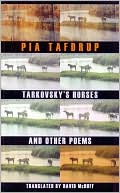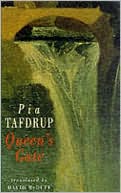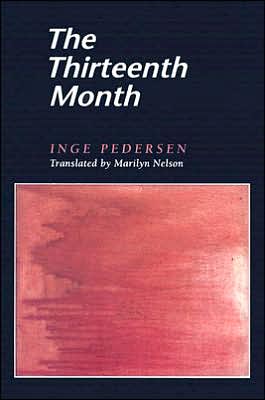It
it is the masterwork by Danish poet Inger Christensen ("a true singer of the syllables," said C. D. Wright), often cited as a Nobel contender and one of Europe's most revered poets. On its publication in 1969, it took Denmark by storm, winning critical praise and becoming a huge popular favorite. Translated into many languages, it won international acclaim and is now a classic of modern Scandinavian poetry.\ it is both a collection of poems and a single poetic epic, forming a philosophical...
Search in google:
Inger Christensen's masterpiece it, translated brilliantly by Susanna Nied, and with an illuminating introduction by Anne Carson.Publishers WeeklyChristensen's sprawling, cosmically ambitious, book-length poem became a national hit in Denmark soon after its 1969 publication, and it's not hard to see why. The segments' diverse shapes prose litany, chiming quatrains, stuttering free verse, telegram, prose diary show mastery enough for almost any taste, while the overarching ideology liberation for the whole human person from institutions, laws, mere forms perfectly fit the late '60s' radical mood. Christensen begins by describing the creation of the whole world, narrows her focus to modern Danish society, then imagines recreating it, first in lyrical fragments ("A happy machine/ A wild imagination/ A fantastic din") and then through extended parables in which patients from an insane asylum learn to love one another and orchestrate social protests involving mass nudity. Drawing on Nietzsche, quoting Blake and Novalis, Christensen promises "crowns of gold for the holy/ fables for the freedom of matter," and argues that "the completely unreasonable activity is in reality reasonable, because it ends in a vision." Nied (who also translated Christensen's Alphabet) duplicates the Danish poem's mathematical schemes while also conveying its freshness and sense of freedom. Poet and classicist Anne Carson contributes a helpful introduction. (Nov.) Copyright 2006 Reed Business Information.
it\ \ By Inger Christensen \ New Directions Publishing Corporation\ Copyright © 1969 Inger Christensen\ All right reserved.\ ISBN: 978-0-8112-1594-7 \ \ \ Contents\ introduction............................ix PROLOGOS................................1 LOGOS...................................23 STAGE symmetries.....................25 transitivities..........................33 continuities............................41 connectivities..........................49 variabilities...........................59 extensions..............................68 integrities.............................77 universalities..........................85 ACTION symmetries.....................93 transitivities..........................101 continuities............................109 connectivities..........................117 variabilities...........................125 extensions..............................133 integrities.............................141 universalities..........................149 TEXT symmetries.....................157 transitivities..........................165 continuities............................173 connectivities..........................181 variabilities...........................189 extensions..............................197 integrities.............................205 universalities..........................213 EPILOGOS................................221 \ Chapter One\ STAGE symmetries 1 Desolation without anyone ever having been there, having died, and then not being there; without there being either a definite or a random place, not random because it lacks placelessness, not definite because it is placeless, without definition, random or not. Like pure being where there is nothing. Outside: all the dirt hurry death destruction words juices beginnings confusion: inside. 2 Darkness: a missing sun here and there, stars that normally, if they could normally be seen, could disclose a mortal gathering, almost all environment, far off. Or light: a warning light buzzes but no one calls out, reacts: the explosion gains speed and the darkness hides what might have happened 3 In the background: stones, cliffs, mountains sawn from plywood, painted, drawn from someone's memory of some drawing of rugged peaks. In the foreground: no one can remember what, if the background were not as described, described an abrupt movement toward everything: the undescribed. To the right: a little moss, a solitary plant: plastic and batting. To the left: beings, milling around if the current is turned on. In addition plans for an artificial rain that will of course awaken a completely indescribable longing. 4 When and if the sets burn, when and if a figure clings in fear to these set pieces when and if this figure even perseveringly utters screams for instance for help, when and if this happens it will be understood: that the man working the spotlight obviously knows what he is doing, that he has obviously just waited until the time was ripe. 5 In front of the mountains, and before the mountains burn or break up as planned, houses are set up, but just houses that are not real houses, but just real fronts of unreal houses into which everyone can easily run when the artificial rain begins 6 Everything is put in place and taken away: oceans are filled in with countries rivers are filled in with roads lakes are filled in with islands excess ice masses, hidden springs and groundwater, water in sewers, oases, raindrops, dew, all are gathered, poured into volcanoes, and evaporate; abysses are filled in with mountains, subways with buildings. houses with still more houses, cities with cities, all with all, till everything is full, till everything is whole, without division, impossible to divide and with no correlates in language. Everything can thereupon and therefore be taken away and put in some completely different place. 7 After the stage, having been painstakingly rinsed with acid, corroded and vanished, the stench came, nausea, hollowness, the words' craving for sets: "mirror" wanted a mirror, "belch" wanted a belch, even "acid" wanted some acid, "set" a set; the words created their own states of being, made a world out of "world." 8 Time: dregs of words like nubbly slugs. Place: solidarity of things like random stones. Motion: slime-tracks of slugs on stones Delusion: all metaphors' theories of unity. STAGE transitivities 1 A word flies up tentatively Flocks haphazardly follow Firm biological forms As if it were a matter of confidence It is a matter of an outermost boundary desolation/non-desolation: a word that flies up flocks that follow neither more nor less birds that fill this endlessly vanishing space with a lack of explanation It is a matter of the very vaguest explanation Maintain this explanation to the end Turn on the wind machine and let angels with beating wings be moved sovereign as satellites Let fleets of oddly backward creatures hurtle away on the wind let insects with sails huge and stripped as shining illusions stand as a vision: the resistance of being to purity 2 They are strangely constructed, the shadows of words; from inside the darkness they see light as dark; they fetter the sources of words to their murder and draw on the language's inherent drought. It is words that incessantly bear a dead paradox dying incessantly, visions unborn, like stars that are finally burned down to carbon or lightning itself struck by lightning in storms. It is shadows arising near words walls of logic biological forms, spread as they decompose revealing a madness that underlies language razed gardens behind iron fencing that grows It is strangely the words hide their own propaganda a trust in exactly the stuff of their faults a landslide turned inward, a muted mutation a wounded milieu wherein suffering exults. 3 A gray misty morning over the painted mountains Whether the birds will waken is still uncertain Memory A stone rolling down from the mountains On a solitary plant a leaf moves In a mossy hollow the pale stalks stir A breeze Whether the sound will carry is still uncertain No one is there yet No one is there to hear and see Hesitation A state of being, waiting for a word The painted mountains vanish Plants and moss are enfolded in earth The mist vanishes A stone flies up over the mountains 4 When the finishing touches have been put on the mountains When the stars have finally been plugged in(to) When the sun is put in place And when the spacing of everything has been re-established When the rain is dammed up in the floating tanks When the white balloon-clouds are released at last And when buoyancy and weight are successfully wrestled into balance When the sap has finally been pumped into every single plastic leaf And when the collective programming of the mobile creatures has mapped out the only possible courses When the performers have finally been taught their places and the man who works the spotlight replaced with a computer The whole staff will talk about fate 5 It was to be like feelings It was to be like the summer destroyed It was to be like the cool pause in the middle of a word It was to be like feelings It was to be like a blow a lapse It was to be like the sweet lapse of forms into formlessness It was to be like feelings It was to be like a denser formlessness It was to be like a boisterous confidence in biology It was to be like feelings It was to be like an eternal interim It was to be like being It was what it was 6 When the diagram of the stage is tied in with the diagram of what is off stage When the word is tied down to the thing and objectively determined by the state of things When language has at last settled out say, along the lines of the oldest minerals and when style has clearly settled in say, along the lines of transparent crystals When communication (say, along the lines of the words used: tied in tied down settled out settled in) is settled, tied, and trapped then choice dream and history must (say, along the lines of the obscurest utopias) write themselves between the lines (say, along the lines of the youngest guerilla) 7 Because it will end in unbearable scenes Because the conditions for doing things for others are others Because the corpses were doused with acid long ago Because the stench stimulates sociability Because the void (say, in the stomach) stimulates production Because nausea creates fertile ground for artificial needs Because acid triggers the craving for fullness Because the belch is part of politics Because the conditions for belching are reserved for the few Because a place in the wings is reserved for the few Because things happen in the wings Because these things must not come to light Because words set the stage for the world Because the world keeps words in their places Because there exists a loathing for it all the mirror has a kind of inverted validity that the truth lacks 8 The change desired is never exactly like the change attained The change attained has nothing in common with the actual change The actual change is deprived of its actuality by psychic dislocations The psychic dislocations are permanently unknown In practice unity will be proven impossible Time place motion no they will never merge here It's a matter of indeterminate points (dream/infinitely receding image/biological signal) where language and the world brush inform deform or whatever each other so that the world continues just continues in spite of the will to change which continues, just continues In practice it will be possible to create solidarity through long-term physical contact In practice it will be possible to destroy solidarity through short-term psychic contact In practice what happens/has happened will stay unformulated STAGE continuities 1 A garden a stair an image a direction Air (Air slipping away from the speakers so words never proliferate but settle like rime on their lips) A stair leading into an image An image at the end of a garden Flowers (Flowers that are never named because the words never proliferate/ the words that never flower) An image of a garden (An image slipping away from the speakers) An image of a garden at the end of an image of a garden (An image slipping away with the speakers) A direction (thick with frost) A stair (leading at last into the ruined lips of the speakers/the angels) 2 Beneath these blankets of snow/these dregs of sun: the eye of the storm completely still in the heart in the heart? no one is there yet but in the chaos of the cells/within their aimless tumbling/ "thoughtlessnesses" there is a confidence in everything random: intervention "proclamations" small explosions or "insanity" gatherings fetters fences Beneath these layers of garden painted from garden to garden, beneath these shadows stretching from image to image/from the bush in one over the path in the other the mountain in the third and farther on over the same endless expanse covered with snow with white-painted snow Beneath these continuous continuations 3 The painted surface splits the varnish blisters peels and the base coat matte white dissolves vanishes some day like melting snow the world ends there And there it begins gratuitously its life/death a matter of course, period The birds waken/The murder takes place 4 A fire alarm rings deep inside the fire The possible courses were possible only before Even a sun disintegrates now and then Only strangely/clearly do you hear the aesthetic echo of death ("fate") 5 the world as thought as dreamed (as in a longing to dissolve) as seen as carried out (as new growth in what is destroyed) as put in place (as foam after the fire) as subordinate to the image (the will of the image) (as fire put out with white-painted snow) as a set the set as thought as dreamed (as a confidence in longing) as seen as carried out (as in a countermove to longing) as put in place (as the possibility of fire) as subordinate to the image (the will of the image) (as snow that melts meeting fire) as the world 6 When it's all white on white When the diagram of the stage/the stage/and the world (give way and vanish in a fog) are painted white When the distinction between inside and outside/the osmotic pressure between the image of the world and the world vanishes (and only the loathing and apathy are left) and only the membrane white and useless limp is left When the white paint is not paint is not white and is not anything else (and everything is withheld from the senses/from language) then it's all over, immaterially ended and the world slowly returns 7 There are war scenes on tapestries hung along the whole Maginot Line meticulous prints of the Spanish Armada afloat on the seas of the world While Potemkin on the front page of Izvestia is shipwrecked on a Pacific island Or statues: Ivan the Terrible smiles at the sight of Harlem de Gaulle rides into Wenceslas Square at the head of the Red Armies and huge modern sculptures: the Great Wall of China between Spain and Spain While Napoleon dies on Formosa 8 That's the way the world is short on truth the principal parties cover a dreaming market with dreams with luxury tactics/ /time must not go to waste That's why the tables are important a collection of static tables in a collection of static strategic places (fantastic genre paintings/ at the foot of a mountain in a marsh on a beach in streets in forests everywhere that there's room for a table a table is set up a table where all possible parties can buy each other a round) The goal is actually to glut the world with tables \ (Continues...)\ \ \ \ \ Excerpted from it by Inger Christensen Copyright © 1969 by Inger Christensen . Excerpted by permission.\ All rights reserved. No part of this excerpt may be reproduced or reprinted without permission in writing from the publisher.\ Excerpts are provided by Dial-A-Book Inc. solely for the personal use of visitors to this web site. \ \
\ Publishers WeeklyChristensen's sprawling, cosmically ambitious, book-length poem became a national hit in Denmark soon after its 1969 publication, and it's not hard to see why. The segments' diverse shapes prose litany, chiming quatrains, stuttering free verse, telegram, prose diary show mastery enough for almost any taste, while the overarching ideology liberation for the whole human person from institutions, laws, mere forms perfectly fit the late '60s' radical mood. Christensen begins by describing the creation of the whole world, narrows her focus to modern Danish society, then imagines recreating it, first in lyrical fragments ("A happy machine/ A wild imagination/ A fantastic din") and then through extended parables in which patients from an insane asylum learn to love one another and orchestrate social protests involving mass nudity. Drawing on Nietzsche, quoting Blake and Novalis, Christensen promises "crowns of gold for the holy/ fables for the freedom of matter," and argues that "the completely unreasonable activity is in reality reasonable, because it ends in a vision." Nied (who also translated Christensen's Alphabet) duplicates the Danish poem's mathematical schemes while also conveying its freshness and sense of freedom. Poet and classicist Anne Carson contributes a helpful introduction. (Nov.) Copyright 2006 Reed Business Information.\ \





